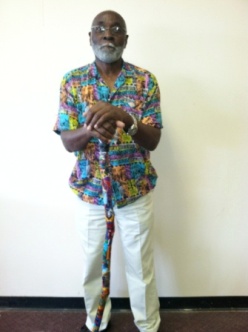 When fabric artist Cleveland Smith started making quilts in 1985, it was because he thought he could make some good money.
When fabric artist Cleveland Smith started making quilts in 1985, it was because he thought he could make some good money.
"I thought I could make three quilts a week, but I soon found that wasn't the case," he says laughing. "It took me a whole day to make one block. And after I made my first pieces, I didn't want to sell them."
More than 25 years later, Smith still makes –and sells—beautiful quilts, based on traditional square nine-patch, and triangular designs. But he also designs intricate wall hangings in colorful fabrics that seem to radiate on the wall.
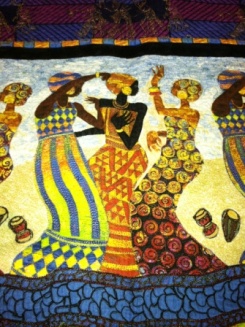 A detail from a wall hanging shows a panel of dancing African ladies A detail from a wall hanging shows a panel of dancing African ladies |
"Once I started doing this, I came to really love the creative part," Smith says. "Every time I design a piece, I try to do something different from anything I've done before."
Originally from Vicksburg, Miss., Smith wanted to leave what he jokingly calls "South America," to try his fortune elsewhere. He came to Portland in 1962 because his aunt, Rosie Peters lived here, and found work at a paper and packaging company in North Portland. Now he has retired, but his art keeps him busier than ever, he says.
Fellow artist Adrienne Cruz introduced Smith to African fabrics, he says, and he began to buy scraps from local African garment makers.
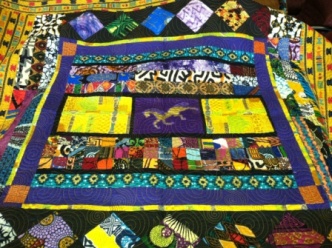 This large (4 ft. x 4 ft. wall hanging features a central panel with a horse and colorful African fabrics This large (4 ft. x 4 ft. wall hanging features a central panel with a horse and colorful African fabrics |
"African fabric is my favorite," he says. "I started with traditional fabrics, but when I was introduced to African fabric it quickly became my favorite. It is so colorful. You can do a lot of things with it. It's just more versatile than other fabrics.
"You don't have to worry about matching colors because everything works together."
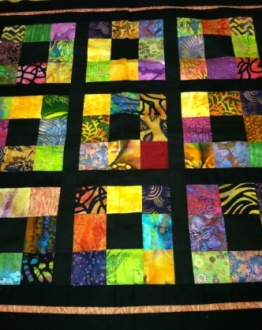
He also uses plain colored cottons, Indonesian Batik and Japanese prints.
No matter whether he's making a quilt or a wall hanging, each piece of fabric must be individually cut out. Sometimes he selects printed fabrics or panels to turn into centerpieces, or to cut out details, which he layers on his designs using appliqué. Most of his pieces include a thin strip that surrounds the work like a colorful frame. He calls this his signature.
Smith does some of his own stitching, but also works collaboratively, sending other pieces to an embroidery specialist, Pat Roche, to be expertly hand stitched.
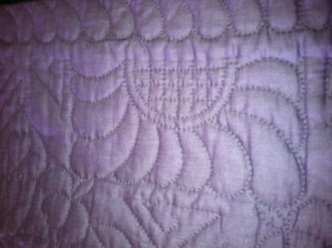 The back of this wall hanging shows the detailed scalloped stitching pattern The back of this wall hanging shows the detailed scalloped stitching pattern |
The Tulip quilt is made from plain colored fabrics rather than Smith's usual African prints |
"See how small these stitches are. She does wonderful work," Smith says.
So how long does it take to make one of Smith's pieces? That depends, he says, on how many projects he's working on simultaneously. He also prioritizes commissioned pieces, he says.
"Each piece takes a long time. 'Stars over Africa' might have taken two or three months."

Smith's fabric collection has grown so much over the years that he could keep on quilting now without ever having to buy another yard. It's just a matter of waiting for the right vision and design to come along for each fabric.
"My grandma, before she died, gave me some of her quilt pieces," he said. "At one time, I almost threw them away. But then I thought she gave these to me not anyone else. So I want to recreate her pattern and take her pieces and have them hand quilted."
Smith's quilts sell from $600 up, while his fabric wall hangings start around $150 depending on size and design.
To contact Cleveland Smith call 503-252-2632






















































































































































































































































































































